- Home
- Troy Denning
The Parched Sea Page 3
The Parched Sea Read online
Page 3
In similar circumstances, any other woman might have returned to her own khowwan, assured that her tribe would have received her with open arms. For Ruha, that possibility did not exist. Even if she returned to the Mtair Dhafir, the old women would blame her for the Qahtan’s disaster and, with a grim air of reluctance, the elder warriors would persuade her father to banish her.
With her magic, Ruha knew she could survive alone in the desert, but the thought of being forced into hermitage made her stomach queasy, and it horrified her. The young woman had not asked for her premonitions, and she had never done anything to deserve banishment. Still, she did not blame her father or the Mtair Dhafir for ostracizing her. To them, her presence seemed dangerous, and they were just doing what they thought necessary to survive. Given similar circumstances, any Bedine would have done the same.
“You do what you must to survive, and I will do the same,” Ruha said, speaking to the distant tribe of her birth. “I’ll ride with any khowwan that will take me, though it be the blood enemy of the Mtair Dhafir.”
As she spoke, Ruha found her throat so dry that the words came out in a series of croaking gasps. Realizing that she was desperately thirsty, the widow reached for Ajaman’s waterskin. The fall had burst the neck open, leaving only a few last swallows in the corners. Ruha placed her lips over the neck to prevent the loss of even a drop, then tilted her head back to drain the precious water into her parched throat.
Nothing.
Ruha tried to swallow again. Still nothing.
With a start, Ruha snapped back to the present, and she realized that she was a half-mile from her dead husband. He was still at El Ma’ra, buried in the cool, shallow grave she had dug for him earlier. Now, she was sitting atop a dune, exposed to At’ar’s full glory and so sun-sick that she was hallucinating.
The young widow angrily pulled Ajaman’s crushed amarat horn from around her neck, then threw it down the dune’s slip-face. It slid clear to the desert’s rocky floor.
“Why did you fall on your waterskin, husband?” she croaked, looking toward El Ma’ra’s tawny pinnacle. “An honorable man would not leave his wife without water!”
Of course, Ajaman did not answer, but Ruha did not doubt that he heard her.
“Ajaman, if you do not send me some water, there will be nobody to wash your body before the journey west,” Ruha threatened, still staring in the direction of her husband’s body. “Tonight, when the vultures come to take you to N’asr’s tent, the odor of life will cling to you like blood on a newborn calf. Surely, the Pitiless One will give you to his djinns, and it won’t be my fault.”
Bartering with the dead was dangerous, the widow realized dimly. Even those who had been friends often repaid their debts with plague and pestilence, but Ruha thought she had done everything she could to find water on her own. She remembered checking the canteen of the straggler she had killed last night. It had been empty. She had even found the milk skin she had been carrying when the attack started, but it had been trampled into the sand by the caravan. Ruha was desperate.
At the oasis there was plenty of water, but she did not dare approach it. In the entire khowwan, not a Qahtani remained alive. The men had fallen in contorted, inert poses at the camp perimeter. In the oasis itself, dog and camel corpses lay scattered among the tents and trees. The women and children were gathered beneath shredded and charred khreimas, their locations marked by lumps and dark stains in the cloth.
But it was not corpses that prevented Ruha from going to the oasis pool and drinking the water she needed so badly. The pale-skinned stranger who had appeared last night in the caravan’s wake was searching the entire camp tent by tent. He had been since dawn. Methodically he furled back each khreima, then kneeled amongst the corpses. After a few moments, he covered the bodies again and went to the next tent. Never, as far as Ruha could tell, did he take anything from the dead or their households.
His behavior was a stark contrast to that of his companions, two creatures who stood about four feet tall. Ruha could tell little about the pair, for they were swaddled head to foot in white burnooses. The short bipeds were robbing the Qahtani warriors, pulling rings off dead fingers and prying jewels from scimitar scabbards.
Watching the strangers continue their desecrations, Ruha wondered who they could be and what they were doing at El Ma’ra’s oasis. Her muddled mind could not even guess at an answer, any more than she could imagine the origin of last night’s murderous caravan. She had never seen anything like either group in the desert, and her ignorance of the lands beyond Anauroch was complete. Both the caravan and the three strangers remained an utter mystery to her.
For the next hour, the widow pondered her ignorance and waited for the strangers to leave. A gray haze appeared on the southern horizon, and Ruha knew that a sandstorm was ravaging some distant part of the desert. She paid it no further attention, for it would not arrive soon enough for her to sneak to the oasis pond beneath its cover.
As At’ar grew brighter and hotter, Ruha’s skin became pale and clammy. She felt sick to her stomach. Her head ached. Spots appeared in her vision, and she could not make them go away.
Ruha turned her gaze toward the vultures, barely able to distinguish the birds from the dots before her eyes. “Surely, N’asr will punish these defilers of the dead. Ask him to do it now, so that I may live and prepare my husband for the journey to your father’s camp.”
If the vultures heard her plea, they gave no sign. The bulky birds continued hanging in the sky, steady as clouds.
The widow waited. She did not exert herself by searching for non-existent shade. In the summer, At’ar rode proud in the sky, and it would have been futile to attempt escaping her heat. Only a tent or a palm tree’s gaunt fronds could offer shelter from the sun, and the only sign Ruha saw of either was in the oasis. Everywhere else, on the gentle slopes and steep slip-faces of the dunes, and in the rocky valleys between them, At’ar blazed down on the parched sands in all her fiery radiance. The yellow goddess could not be avoided.
Ruha could feel herself growing perilously weak, but she resisted the dry voice whispering to her to sneak back to the oasis. Whoever the strangers were, their desecrations made it clear that they were no friend of the Bedine, and from what she had seen last night, the instincts of the one-eyed stranger were too sharp to challenge.
As she thought about the stranger, Ruha’s mind wandered and she once again found herself standing in last night’s shadows, the dead straggler lying in the sand beside her. The stranger was crouched atop the dune, where he had appeared so suddenly in the wake of the caravan. As the screams of dying Qahtanis began to drift over the sands, he continued to watch the battle, his attention fixed impassively on the oasis.
Ruha wondered if he was the man who killed Ajaman. Confident of the magic that kept her hidden and unheard, she gripped her jambiya and prepared to take vengeance.
As she picked up the handful of sand she needed to create her magical lion, the one-eyed man whirled about and drew a straight-bladed dagger. He stared into the quiet darkness protecting the young woman, seeming to sense her presence in spite of the spells hiding her. The stranger shook his head once, then sheathed his dagger.
Was he warning Ruha not to attack, or did he doubt the instincts that had alerted him to her presence? Before Ruha could decide, the stranger slipped down the other side of the dune and disappeared. The widow’s knees were ready to buckle and her stomach felt as though her heart had dropped into it. She did not follow.
With a start, Ruha realized that the ache in her stomach was more than fear, and that her confused mind had again lost track of reality. Heat cramps were causing the pain she felt, and the reason it seemed like night was because her eyes were dosed. She had lost track of reality again, drifting into a dream of last night.
Ruha held her head with both hands, vainly trying to stop the fierce pounding inside. The young widow realized she had to risk going to the pond, even without any spells to conceal her. Wi
th his acute instincts, the stranger would probably see her as she drank, but to wait was to die.
Ruha slid a few feet down from the dune crest, then turned toward the rocky labyrinth behind her.
To her surprise, a string of ten white camels stood two hundred feet away. Believing that her mind was playing tricks on her, she closed her eyes and whispered, “Husband, by the last drop of water in my mouth, if this is a mirage, I will be slave to N’asr himself before I wash your filthy corpse.”
When she opened her eyes again, the beasts were still there. Though clearly mature riding camels, they had no halters or saddles. Instead, their driver had looped long ropes around their lanky necks and run lines from one beast to the next. The sight puzzled Ruha, for any man who owned ten matched camels could certainly saddle them properly.
Only the lead camel, an indistinctive brown gelding, carried a proper saddle or halter. Upon this beast sat a lone tribesman, his bow strung and his lance resting across his thighs. He wore a tawny aba similar to Ajaman’s, and a white keffiyeh covered his hair. Though Ruha could not see his face at this distance, his head seemed turned toward her. Ruha guessed by his dress that the driver belonged to the Qahtan tribe, perhaps even her dead husband’s clan.
Continuing her slide down the dune, she croaked, “Worthy Ajaman, I should have known better than to doubt you, but I am a frail woman and thirst affects my judgment. Please forgive my nagging and don’t send any blights to punish me.”
When her feet touched the rocky desert floor, she checked to see that her veil was still in place, then staggered toward the man.
Upon seeing her condition, the rider unfastened his waterskin and slid off his saddle. He thrust his lance into the closest dune, then wrapped his lead camel’s reins around the shaft. Without actually running, for a wise man never ran in the heat of the day, he rushed toward Ruha.
The widow’s first impression was that he was a herdboy, for his face lacked even the hint of whiskers. His features were proud and strong, like Ajaman’s, but his skin looked as soft as a pup’s fur, and he did not stand even as tall as she did. He could have been no more than thirteen or fourteen. Still, Ruha stopped short of asking him to fetch his master. If the Qahtani customs bore any similarity to those of most Bedine, a herdboy would not carry a lance. That privilege belonged only to a warrior.
Instead, as the boy approached, she managed to gasp a question. “Whose fine camels are those?”
The youth showed a smile of pearly teeth. “They once belonged to a sheikh of the Bordjias,” he answered, straightening his shoulders as if donning an aba.
The answer explained the lack of saddles and halters. What the youth had left unspoken was that now the camels belonged to him. He had stolen them on a raid. If, as he claimed, the animals had belonged to a sheikh, the pasture had undoubtedly been a well-guarded one. Ruha was glad she had not insulted the young man by asking after his master.
The youth stopped a pace away from Ruha and passed the waterskin to her. Observing that he self-consciously kept one hand close to the hilt of his jambiya, Ruha said, “A careful warrior will make a wise elder.”
The boy nodded, then answered, “My father says it is honorable to help a stranger, but to remember that no friend is ever a stranger.”
“Your father is right,” Ruha answered, lifting the skin to her mouth.
Though the water was hot and tasted of several days in the skin, to her it seemed as if it had just come from a cool spring. Still, she stopped herself after three swallows, for drinking too much too quickly would make her feel worse than she did now. Besides, when a stranger shared his water, one never knew how much he had to spare. She offered the skin back to the youth.
The boy shook his head. “Drink. I have another.” He spoke with an exaggerated tone of authority.
Ruha allowed herself two more swallows. “Your water is sweeter than honeyed milk,” she said. Though she meant what she said, the words were weighted with exhaustion. They sounded insincere even to the young widow.
The youth smiled and shook his head. “That water’s been in the skin for five days. You’ve been out here watching my khowwan too long.”
“It’s my khowwan, too,” Ruha answered. “Or at least it was.”
The boy’s smile faded. “What do you mean?”
Ruha pointed at the vultures hanging over the oasis. “Surely you’ve seen N’asr’s children?”
The young warrior nodded. “That’s why I hid my approach behind the dunes, but I meant to ask why you claim to be Qahtani. If you were a member of the tribe, I would know you. There aren’t that many of us.”
“I’m Ruha, Ajaman’s wife,” she answered.
The youth’s hand drifted back toward his dagger. “Ajaman has no wife,” he said suspiciously.
Shrugging aside his skeptical tone, Ruha lifted the waterskin to her lips again. She still felt weak and dizzy, but with an ample supply of water at hand, she would soon be better. After a few swallows, she lowered the skin and said, “I came to the Qahtan three days ago.”
“Forgive me,” the boy said, flustered. As an afterthought, the boy offered, “I was on el a’sarad.”
Ah, Ruha thought, that explains the warrior’s age. The el a’sarad was a solitary camel raid undertaken as a rite of passage—after a boy killed his first man.
The youth continued, “I had not heard that my brother had taken a wife.”
“Brother!” Ruha gasped.
The youth nodded. “Sons of the same mother.”
In her weakened state, the shock was too much for Ruha. She began to wail uncontrollably, half sobbing and half laughing at her fate. A man was obligated to care for a dead brother’s wife for two years, after which time he had the choice of sending her away or marrying her himself. Ruha found it pathetically ironic that her new protector and potential husband was a thirteen-year-old boy. Dropping the skin, the widow collapsed to her knees and buried her face in her palms.
The youth quickly picked up the waterskin, then took Ruha’s arm and helped her to his camels. He sat her in the shade beneath one of the beast’s musky udders, then said, “I am called Kadumi.”
As the camel stamped its fleshy feet on the ground, he poured water on the only exposed parts of Ruha’s face, her cheeks and her brow. The water evaporated as soon as it touched her skin, without cooling her at all.
Regaining control of her spent emotions, Ruha put her hand over the spout. “Save the water. I’ll be fine.”
Kadumi closed the skin and placed it beside her. Turning in the direction of the unseen oasis, he asked, “Where are the other women? How badly is the tribe hurt?”
The young widow touched the ground in front of her. “Sit.”
Kadumi shook his head. “I’ll stand,” he declared, as if hearing the report on his feet made him more of a man.
“Kadumi, this was no camel raid,” Ruha began.
“Tell me what happened,” he replied, still refusing the seat she offered.
Ruha shrugged, then began. “It was after dark. Ajaman had the night watch, and he wanted me to bring him some apricots and milk.”
“Ajaman wouldn’t ask his wife to leave their tent during the purdah,” Kadumi interrupted, frowning.
“He did ask it,” Ruha snapped, irritated that the youth had noticed her misrepresentation. “Do you question the honor of your brother’s wife?”
Startled at the terse reply, Kadumi turned his gaze aside. “Let’s say he asked you to come to him. Then what?”
Trying not to sound defensive, she continued, “Before I reached him, a caravan of men and fork-tongued monsters came out of the sands.”
“Fork-tongued monsters?”
“Yes,” Ruha replied. “With a lizard’s skin and a snake’s eyes. Where there should have been nose and ears, the beasts had only gashes. There were hundreds, maybe thousands. Behind them came caravan drivers in black burnooses.”
Ruha paused, smelling once again the scent of singed camel-hair and scorc
hed flesh as the strange caravan attacked. Over the dunes rolled the mournful howls of anguished mothers, the terrified screams of dying children. Peering over a dune crest, Ruha saw a thousand silhouettes marching through the oasis, setting fire to anything that stood, cutting down anything that walked.
“What do they want?” she asked. “How can I stop them?”
Water trickled down her face, and then she was no longer watching the battle.
“Drink,” Kadumi said, offering her the open waterskin as his face replaced the dark images from the previous night. “You’re seeing mirages.”
Ruha pushed the skin aside. “There were too many strangers,” she replied. “I couldn’t save anyone.”
“I understand,” Kadumi answered, sealing the skin. “What of the others who escaped? Where are they?”
“Others?” Ruha yelled. The camel beneath which she sat brayed and stepped forward, brushing Ruha’s head with its udders. She ignored the beast. “Haven’t you been listening? There are no others!”
Kadumi’s face went pale and the waterskin slipped from his hand. An expression of disbelief and bewilderment overcame the boy, and Ruha immediately regretted her sharp tone.
Before she could comfort the boy, he set his smooth-skinned jaw. “Who did this to my tribe?” he hissed. “Who were these men and fork-tongued monsters?”
Ruha shook her head. “I don’t know,” she whispered.
“What color were their keffiyehs?” Kadumi pressed. “Did they ride the long-wooled camels of a northern tribe? If they are a Qahtani enemy, I will know them from your description.”
Ruha looked straight into Kadumi’s eyes. “They weren’t Bedine,” she said. “I don’t even think they were from Anauroch.”

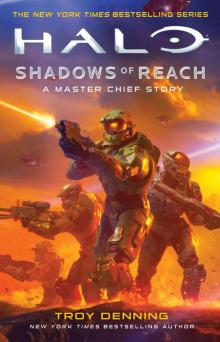 Shadows of Reach: A Master Chief Story
Shadows of Reach: A Master Chief Story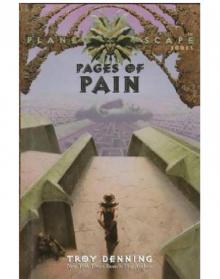 Pages of Pain p-1
Pages of Pain p-1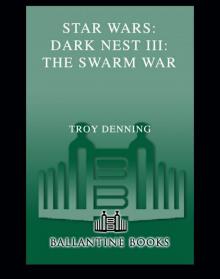 Star Wars 396 - The Dark Nest Trilogy III - The Swarm War
Star Wars 396 - The Dark Nest Trilogy III - The Swarm War Star Wars: Fate of the Jedi: Apocalypse
Star Wars: Fate of the Jedi: Apocalypse A Forest Apart
A Forest Apart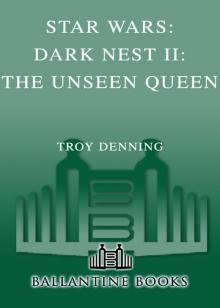 Star Wars: Dark Nest II: The Unseen Queen
Star Wars: Dark Nest II: The Unseen Queen Star Wars: A Forest Apart
Star Wars: A Forest Apart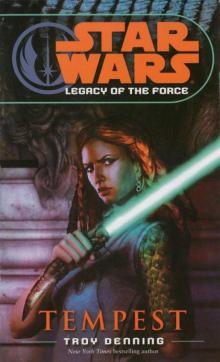 Tempest: Star Wars (Legacy of the Force) (Star Wars: Legacy of the Force)
Tempest: Star Wars (Legacy of the Force) (Star Wars: Legacy of the Force) Star by Star
Star by Star Crucible: Star Wars
Crucible: Star Wars Last Light
Last Light Invincible
Invincible Inferno
Inferno Star Wars - The Trouble With Squibs
Star Wars - The Trouble With Squibs Abyss
Abyss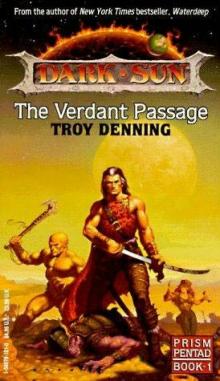 The Verdent Passage
The Verdent Passage Vortex: Star Wars (Fate of the Jedi) (Star Wars: Fate of the Jedi)
Vortex: Star Wars (Fate of the Jedi) (Star Wars: Fate of the Jedi)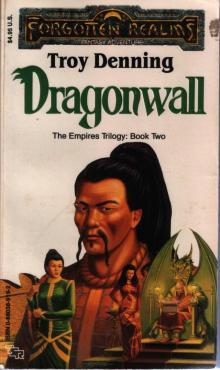 Dragonwall e-2
Dragonwall e-2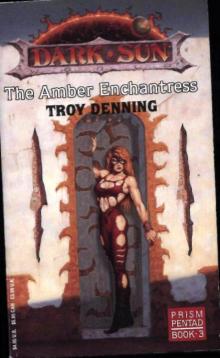 The Amber Enchantress
The Amber Enchantress Crucible
Crucible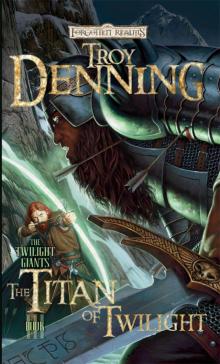 The Titan of Twilight
The Titan of Twilight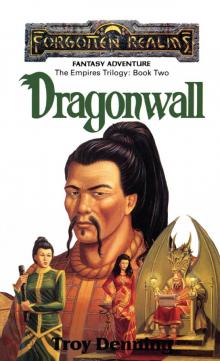 Dragonwall
Dragonwall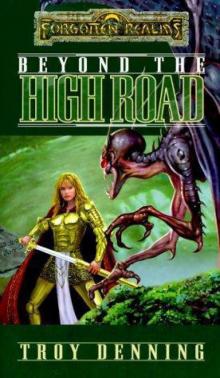 Beyond the High Road c-2
Beyond the High Road c-2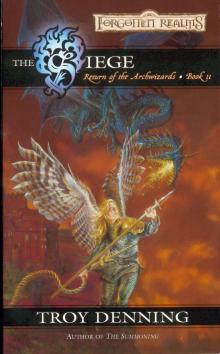 The Siege rota-2
The Siege rota-2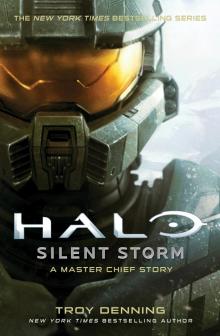 Silent Storm: A Master Chief Story
Silent Storm: A Master Chief Story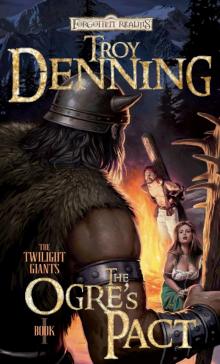 The Ogre's Pact
The Ogre's Pact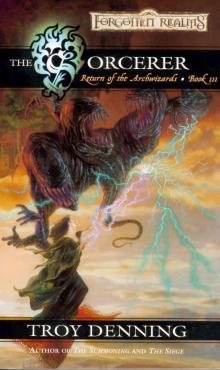 The Sorcerer rota-3
The Sorcerer rota-3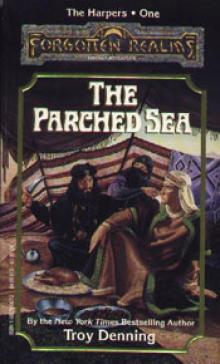 The Parched sea h-1
The Parched sea h-1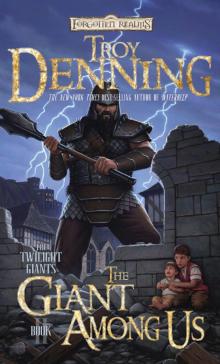 The Giant Among Us
The Giant Among Us Recovery
Recovery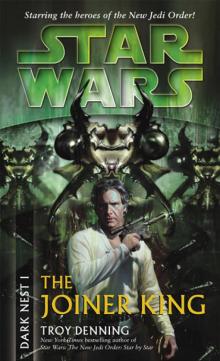 Star Wars: Dark Nest 1: The Joiner King
Star Wars: Dark Nest 1: The Joiner King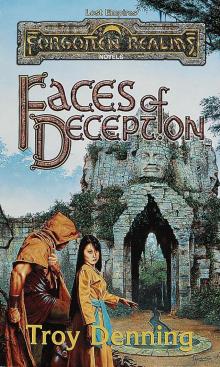 Faces of Deception le-2
Faces of Deception le-2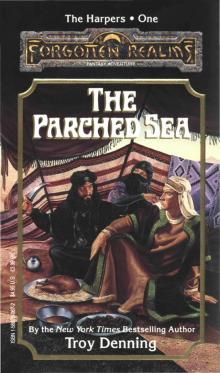 The Parched Sea
The Parched Sea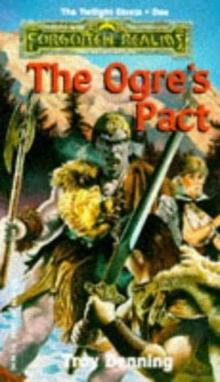 The Ogre's Pact зк-1
The Ogre's Pact зк-1 Apocalypse
Apocalypse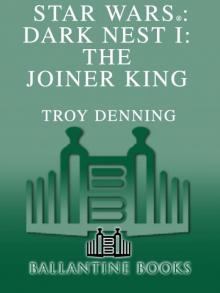 Star Wars®: Dark Nest I: The Joiner King
Star Wars®: Dark Nest I: The Joiner King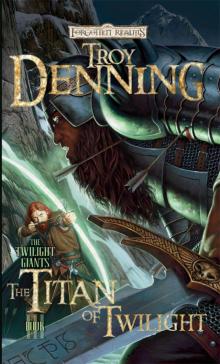 The Titan of Twilight ttg-3
The Titan of Twilight ttg-3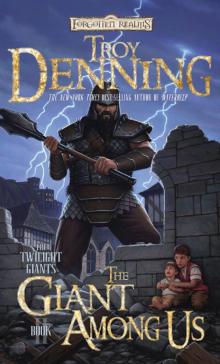 The Giant Among Us ttg-2
The Giant Among Us ttg-2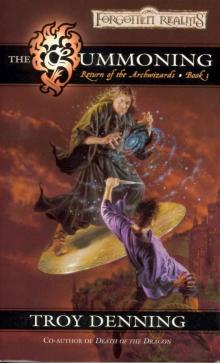 The Summoning rota-1
The Summoning rota-1 Tatooine Ghost
Tatooine Ghost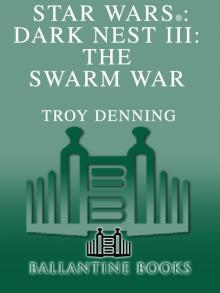 Star Wars®: Dark Nest III: The Swarm War
Star Wars®: Dark Nest III: The Swarm War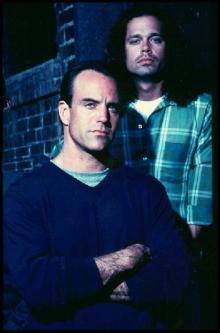 Retribution
Retribution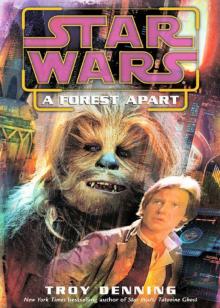 A Forest Apart: Star Wars (Short Story)
A Forest Apart: Star Wars (Short Story)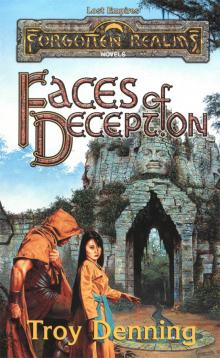 Faces of Deception
Faces of Deception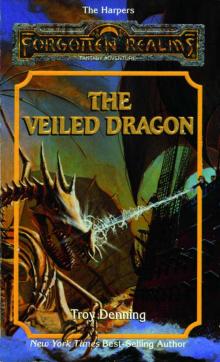 The Veiled Dragon h-12
The Veiled Dragon h-12 Star Wars 390 - The Dark Nest Trilogy I - The Joiner King
Star Wars 390 - The Dark Nest Trilogy I - The Joiner King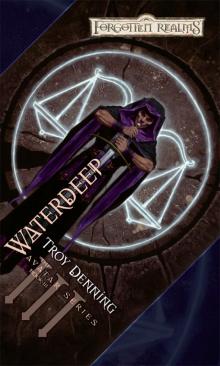 Waterdeep
Waterdeep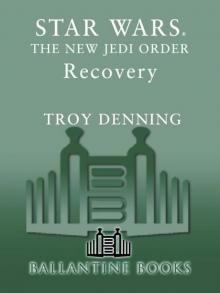 STAR WARS: NEW JEDI ORDER: RECOVERY
STAR WARS: NEW JEDI ORDER: RECOVERY